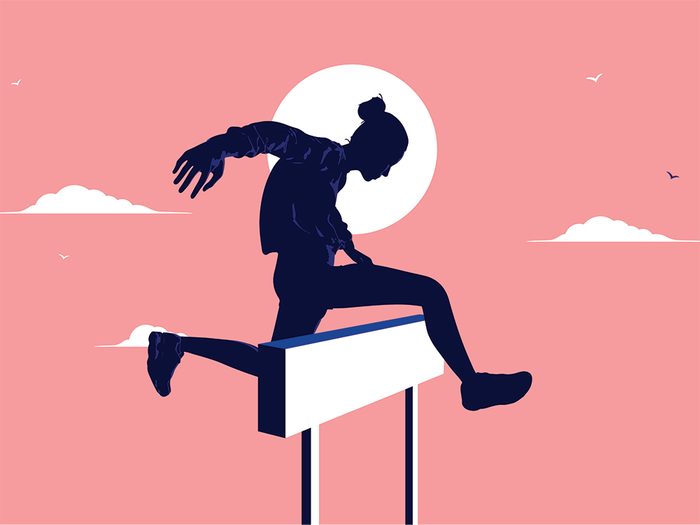5 Olympian-Worthy Coping Strategies to Use During the Pandemic

Tessa Virtue’s mental performance coach shares tips for living with uncertainty in everyday life
You’d never think that Tessa Virtue had any self-doubt. But the recently-retired Canadian ice dancer—and most decorated female Olympic figure skater in history—remembers worrying about falling in front of judges, despite the countless hours she spent practicing. “The moments of uncertainty, self-doubt, stress, pressure, and anxiety are endless as an athlete,” says Virtue.
To succeed as a professional athlete, it takes not just physical strength, but also mental strength. Virtue credits her ability to manage her negative thoughts to Jean François Ménard, mental performance coach and public speaker. “His approach ensured I not only expected nerves, but rather embraced and practiced handling them,” says Virtue.
Ménard’s coping strategies aren’t just reserved for athletes ahead of a game or performance. Virtue also applies Ménard’s advice to her everyday life, when facing worries during the pandemic. “Crafting healthy routines, being comfortable within the uncomfortable, and celebrating little wins are three pillars I have held onto (tightly),” says Virtue.
In light of Ménard’s book Train (Your Brain) Like an Olympian published in January, 2021, we caught up with him to learn about the coping strategies he teaches Olympians that everyone could use right now. Here, Ménard’s five ways to weather through the mental toll of uncertainty.
(Related: 6 Breathing Exercises for Anxiety That Can Help You Feel Calmer)
1. Accept your lack of motivation
“We are not as focused as we were before [the pandemic],” says Ménard. Now, many people are juggling working-from-home with childcare, housework, and sharing space with other family members—all on top of pandemic stress. “Everything is different than it was before the pandemic, so if we compare our motivation to what we had then, we’re going to lose,” Ménard says. This may mean creating new goals for yourself—ones that are more realistic given the current state–and readjusting your perspective.
2. Practice “mental toughness”
To deal with difficult situations, we require mental toughness, says Ménard. For that, he recommends using “FEAR,” an acronym for “face everything and rise”—which involves adopting a positive and constructive attitude. Rather than succumbing to the deluge of bad news, appreciate the strength you gained to overcome it and the lessons you learned. “Think about what it is going to take later on [after the pandemic] to throw you off,” says Ménard. You have the chance of coming out stronger.
3. Embrace “sisu”
The key to building up mental strength is “sisu,” a Finnish concept that basically means you need to establish a “combination of perseverance, resiliency, courage and bravery,” says Ménard. It’s the act of pushing yourself forward despite the uncertainty of the pandemic and finding the discipline to adapt and keep carrying on when it feels like you can’t. Ménard gives the example of having to work from home: you could either continue to stress over the office reopening or you could accept the situation and work on organizing your current environment to make it work for you as best as possible. The achievement is in knowing that you did everything you could to come close to pre-pandemic productivity levels.
4. Get more SENS
“I don’t think there is a better time to take care of ourselves,” Ménard says. He uses the acronym SENS to stand for sleep, exercise, nutrition, and stress management. While this one might seem obvious, he points out that many of us simply don’t prioritize SENS enough in our lives. “You’re in full control of your inside world and that is where you need to put your focus,” he says.
5. Remember: “It is what it is, not what it’s supposed to be”
This quote is from Ménard’s book. “Get away from what is ‘supposed’ to be or what you would love to do,” says Ménard. “Bring your thoughts back to what is going on right now.” If 2020 was the year of cancelled plans, 2021 is the year of not even knowing what to plan for, and that can make us feel out of control. Instead, try to appreciate the simple bits of pleasures found in your day-to-day life. “As a perfectionist, I often have to remind myself to rejoice in the little victories, however small,” says Virtue. As long as such celebrations are consistent, she says, they’ll help build confidence and boost your mood.
Next: How Rumination and Obsessive Thoughts Are Linked to Anxiety and Depression




